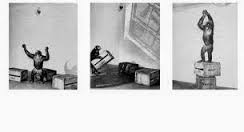QUICK REVIEW:
Whatever is good to know, is hard to learn – Greek Proverb

•Learning: Relatively permanent change in behavior that is brought about by experience
•Behaviorism: The theory of learning that focuses solely on observable behaviors
TYPES OF LEARNING:
•Classical Conditioning
•Operant Conditioning
•Social/Observational Learning
•Cognitive Factors in Learning
Classical Conditioning: Type of learning in which a neutral stimulus comes to elicit a
response after being paired with a stimulus that naturally brings about that response

•Operant Conditioning: Learning through positive and negative reinforcement: A form of learning that takes place when an instance of spontaneous behavior is either reinforced by a reward or discouraged by punishment
Behavior Followed by a Consequence
SOCIAL LEARNING THEORY – OBSERVATIONAL LEARNING
Monkey See, Monkey Do
•Observing and Imitating Another’s Behavior
Social/Observational Learning
•Occurs when an observer’s behavior changes after viewing the behavior of a model
INSTINCT LEARNING
Kohler Experiment Insight/Instinct Learning
In the 1920’s, German psychologist Wolfgang Kohler exposed chimpanzees to novel learning tasks and concluded that they were able to learn by insight
 SULTAN
SULTAN
Instinict/Innate Versus Learned Behavior
Instinct is innate, meaning that instinctive behaviors and responses are present and complete within the individual at birth. In other words, the individual does not have to undergo any experience to acquire such behaviors. For example, fish have an innate ability to swim, whereas most mammals must learn how to walk. It is fairly easy to identify innate behavior when an animal exhibits it at birth, but in some cases innate behavior manifests only later in life (Science Clarified, 2016).
- Inborn, unlearned, goal directed behavior that is characteristic of an entire species
- Human behavior is not easily explained by instincts because:
–Important Human behavior is learned
–Human behavior is rarely inflexible
References:
Bernstein, D.A. & Nash, P.W. (2008). Essentials of psychology (4th ed.) Boston: Houghton Mifflin Company.
Feldman, R. (2013). Essentials of understanding psychology (11th ed.). New York, NY: McGraw-Hill.
Friedman, H.S. & Schustack, M.W. (2012), Personality: classic theories and modern research (5th ed). Boston: Pearson Allyn & Bacon.
McGraw-Hill.McGraw Hill Higher Education (2013), The McGraw Hill Companies, Inc.
Ryckman, R. M. (2013). Theories of personality (10th ed.). Mason, OH: Cengage Learning.
Science Clarified, Real Life Biology, Vol. 3 – Earth Science, Vol. 1/Instinct and Learning



read and understand the different between innate and learning behavior
LikeLike
Read and somewhat understood innate is very similar to instinct and reflexes touching something hot etc
LikeLike
Read and understood , just one question can learned behaviors become instincts after you perform them over and over again ?
LikeLike
Yes The greater percentage of all human instinct are learned
LikeLike
read and understood. one question though, can learning impact one’s innate behavior?
LikeLike
Yes
LikeLike
Read and Understood, will need to memorize
LikeLike
Read and Understood.
LikeLike
Read , but certain parts confused me!
LikeLike
read and understood
LikeLike
read and understand
LikeLike
Read and understood most of it professor
LikeLiked by 1 person
Read/ watched and semi understood..
LikeLiked by 1 person
Read and understand
LikeLiked by 1 person
Read and understood! 😀
LikeLiked by 1 person
read and understood but a bit confused,
LikeLiked by 1 person
Read and watch videos, some of them I kind got the Idea for example Albert Banura theory was ok to understand it and other felt I need more explaining especially when it comes to the different type of learning.
LikeLiked by 1 person
read it and a little confused
LikeLiked by 1 person
I read and understand four types of learning operant, classic,observational and innate
LikeLiked by 1 person
Read it and i understand mostly
LikeLiked by 1 person
read and understood
LikeLiked by 1 person
read and somewhat understood but I would like to learn more about the differences of Inmate and learned learning
LikeLiked by 1 person
Innate is instinct versus learned behavior!!
LikeLike
read and understood for the most part!
LikeLiked by 1 person
The video between these two different types of behaviors really interested me because of the way that the teacher explained it. He made it seem much easier to understand through using real-life, simple examples such as a bird already having instincts and born with behaviors and also using a spotlight and how we react to it. After watching the video, I know now about how unaware I am about the instincts that I make, mostly about kinesis where I may make random noises or movements from time to time due to a certain stimulus that provokes me. I’m more interested, however, in learned behavior and how not only can we be able to learn and display that behavior later, but animals can do so as well. I want to continue learning specifically about operant conditioning and how intense animals can react to a certain stimulus through this type of conditioning.
LikeLike